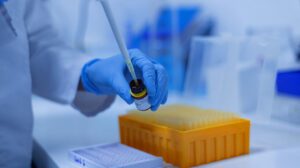
The Ministry of Foreign Affairs of Ukraine and the Ministry of Health of Ukraine have been instructed to prepare proposals on the advisability of installing additional controls and restrictions on migration between Ukraine and countries where the Delta coronavirus (COVID-19) strain is rapidly spreading.
According to the presidential press service, during a conference call at the President’s Office, its participants heard information from the National Academy of Sciences of Ukraine on the spread of COVID-19 Delta strain.
According to the National Academy of Sciences, “this strain of coronavirus is 1.6 times more infectious than the Alpha strain, some 2.26 times more likely to lead to hospitalization, and the risk of resuscitation in case of infection increases 1.45 times.”

The Global Affairs Canada, implementing the Ukraine Horticulture Business Development Project (UHBDP), has decided to extend the project until March 31, 2022, whereas it was previously planned to be completed in 2021, project manager Dmytro Nikolayev said during a press conference in Kyiv. According to him, UHBDP for the period from 2014 to 2021 provided financial support for a total of UAH 43.25 million for 2,780 clients.
He clarified that by March 31, 2022, the project will additionally support clients under various programs in the amount of about UAH 20 million. He clarified that at present UHBDP focused on informing farmers about the legislative features of the land market launched from July 1, developing and implementing educational and online trading platforms, and providing grants for business restoration to the most vulnerable groups of agricultural producers.
As reported, UHBDP finances 30% of the total cost of projects, which are at least estimated at $ 200,000. The term of their implementation is a year and a half.
The Ukraine Horticulture Business Development Project (UHBDP) is funded by the Global Affairs Canada, implemented and co-financed by the Mennonite Economic Development Associates (MEDA). MEDA works with Israel’s Agency for International Development Cooperation(MASHAV) and international service companies to provide technical support.
UHBDP works with producers from Zaporizhia, Kherson, Mykolaiv and Odesa regions, engaged in fruit and vegetable growing, berry growing, viticulture and beekeeping.

The Ukrainian national football team on Monday suffered a defeat in front of the Austrian team with a score of 0:1 in the match of the third round of the 2020 European Championship.
According to the match broadcast, in the 21st minute the Austrian national team took the lead. After filing a standard, Christoph Baumgartner beat Illia Zabarny and shot into the corner of the goal of Heorhiy Bushchan.
Mykola Shaparenko tried to attack with a blow, but the Austrian goalkeeper deflected him, and Andriy Yarmolenko’s leg did not reach for finishing.
However, the Austrians had two points to increase the score. In particular, Marko Arnautovic first missed the goal from 12 meters away, and at the end of the half, the Austrian national team player failed to outplay Bushchan.
In the second half, there were no significant changes in the game. Austria controlled the game, almost scoring into their own goal. Until the end of the half, the Austrians lost several chances to double the result. In one case, Bushchan made a save after being hit by Stefan Lainer, in the other Arnautovich made a mistake.
In general, Austria played according to the score and did not give Ukraine a chance to recoup a positive result.
As a result, with a score of 0:1, Ukraine lost the second position in the group, going down to third. Andriy Shevchenko’s team has a 4:5 ratio of goals scored and conceded, which makes it difficult to get into the playoffs due to the rating of the third teams.
The final situation in the ranking will be announced on June 23 in the evening.

SkyUp (Kiev) has expanded its fleet with a medium-haul Boeing 737-900ER aircraft, increasing its fleet of aircraft to 12 units.
According to the press service of the company, the new aircraft is designed for 215 passengers and will operate flights on all routes in the airline’s schedule. This is the fourth aircraft of this model in its fleet.
“The aircraft, produced in 2008, arrived in Ukraine in the branded SkyUp livery. Also on board are seats of the British brand Acro, which provide more space between the rows for a convenient flight of passengers, and the wings are equipped with split winglets Split Scimitar to save fuel and improve aerodynamics,” the report says.
The aircraft received the state registration number UR-SQL.
Currently, along with the new aircraft, the SkyUp Airlines fleet includes 12 medium-haul aircraft: two Boeing 737-700 NGs with 149 seats, six Boeing 737-800 NGs with 189 seats, four Boeing 737-900 ERs with 215 seats.
By the end of summer, the company plans to replenish its fleet with one more aircraft.

OKKO Group plans to install solar power plants at more than 80 fuel filling stations, founder of the holding Vitaliy Antonov said on his Facebook page.
He also informed about the opening of a solar power plant at a fuel station in Odesa at 2a Pestelia Street.
“For the Ukrainian fuel retail, this is a unique project. Both from an architectural and engineering point of view. We do not just have solar panels on the roof here. They themselves are a roof. Some 316 panels with a total area of more than 600 square meters convert ultraviolet light into useful energy,” he said.
He clarified that thanks to its own generation, the new filling station will be able to independently cover up to 70% of its electricity needs, and in warm weather – 100%.
“And I want to note that we approach cooperation with the sun systematically,” Antonov emphasized.
The OKKO filling station network (Galnaftogaz Concern) is a part of OKKO Group and is one of the largest filling networks in Ukraine, numbering 413 fuel filling complexes. The structure of the company also includes Ukraine’s largest network of food outlets on the road operating under the brands Hot café, A la minute, Pasta Mia and Meiwei, as well as the specialized operator OKKO Agrotrade, engaged in the development of the agricultural direction.
The company’s divisions are engaged in the sale of goods through stores at filling stations, the sale of petroleum products in large and small wholesale, provide services for the examination of the quality of fuel, storage and transportation of petroleum products. The OKKO network has ten own oil depots, one gas pumping station, 19 stationary and mobile laboratories for quality control of petroleum products.
The shareholder and institutional investor of the company is the European Bank for Reconstruction and Development.

The initiative for coal regions in transition in the Western Balkans and Ukraine, led by the European Commission, will help them attract funding from a number of international financial institutions (IFIs), according to the announcement of the annual meeting of the initiative on June 23-25, made by the Delegation of the European Union in Ukraine. “The aim of the event is to support open, multi-stakeholder dialogue on coal phase out and just transition towards sustainable energy sources in Bosnia and Herzegovina, Kosovo, Montenegro, North Macedonia, Serbia, and Ukraine,” according to the announcement.
As noted in the EU Delegation, “the initiative will help coal regions access financing for transition projects or programmes, based on various sources available from the European Commission, the World Bank, the European Bank for Reconstruction and Development, and the European Investment Bank.”
In addition, the initiative contains four other pillars of support. This is a comprehensive stakeholder dialogue, an exchange program between coal mining regions, trainings by the Coal Region Learning Academy and technical assistance.
As stated on the website of the European Commission, the initiative for coal regions with economies in transition in the Western Balkans and Ukraine was launched in December 2020 and aims to help countries and regions move from coal to a carbon-neutral economy. It will support coal regions in the EU’s neighboring countries, namely Bosnia and Herzegovina, Kosovo, Montenegro, North Macedonia, Serbia and Ukraine.
The initiative is managed by the European Commission and collaborates with six international partners: the World Bank, the Energy Community Secretariat, the European Bank for Reconstruction and Development (EBRD), the European Investment Bank (EIB), the National Fund for Environmental Protection and Water Management of Poland (NFOSiGW), and the College of Europe in Natolin.